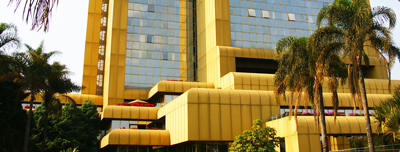Trade & Investment
Unlock Opportunities in Zimbabwe Today.

Why Invest in Zimbabwe
-
1. Zimbabwe is OPEN FOR BUSINESS. The Government of Zimbabwe has taken and continues to take various measures or reforms to improve the Ease of Doing Business in the country. For further information, please log onto www.zidainvest.com.
2. Zimbabwe is a stable, peaceful and secure country, endowed with abundant natural resources across all economic sectors. Zimbabwe has a rich variety of commercially exploitable mineral deposits and the country’s soils and climate are very conducive to producing a wide range of agricultural commodities.
3. Geographically, Zimbabwe is centrally and strategically located in the Southern African sub-region. It forms part of the North-South Corridor and is a gateway linking South Africa with countries to the north of Zimbabwe like Zambia, the DRC, Malawi into the African hinterland. Because of its geographical location, Zimbabwe is well positioned to serve regional markets. The country is also a regional logistics hub as it is well supported by sound infrastructure (e.g., railway lines, roads, power grids, and telecommunication).
4. The Zimbabwean human capital is highly skilled and very hardworking. Its literacy rate is among the highest in Africa.
Investment Opportunities

Energy
Zimbabwe is open to investments in hydropower generation, coal bed methane gas, and renewable energy generation like wind and solar. Zimbabwe has hydropower potential of over 3000MW, available mainly on the Zambezi River. The country also has an estimated 40 trillion cubic feet of CBM reserves, which can be utilized to generate power as well as support industrial energy and the petroleum industry. Zimbabwe has approximately 26 billion tons of coal reserves for power generation.
Manufacturing Sector
In addition to value addition of primary products from the agriculture and mining sectors, there are also opportunities for the manufacture of industrial and agricultural chemicals, fertilizers, insecticides, detergents, soaps, plastic products, paints, polishes, glues, etc., for local, regional, and global markets. Opportunities also exist in textiles, leather, timber, furniture, and metal production.
Information and Communications Technology
Zimbabwe’s economic transformation hinges on maximum exploitation of information communication and technologies in all facets of the economy. The country welcomes investments in the ICT sector. Investment opportunities in the ICT sector include: The provision of media services, Supply of digitalization equipment, E-Business, Software development, Business process outsourcing, Data storage area network, Hardware assembly, Call centers, Film industry, Graphics and multimedia development.
Infrastructure Development
Zimbabwe’s economic development and growth require further development and expansion of infrastructure. The country needs more power generation infrastructure, improved water supply infrastructure, modern highways, and resurfacing of existing highways. Private sector participation is welcomed through Public-Private Partnerships (PPPs) in developing and providing modern infrastructure.
Tourism, Hospitality, and Catering Sector
Key investment opportunities in the tourism industry include: construction of hotels and lodges to cater for the increasing number of tourist arrivals every year,world-class conference facilities, golf courses, safari and tour operators, theme parks, water sporting facilities.

Agriculture Sector
Agriculture is the engine of the Zimbabwean economy. The country, which for decades held the position of the “Breadbasket of Southern Africa”, has one of the best farming climates and fertile soils in the world thereby making agriculture a highly viable and profitable investment portfolio. Zimbabwe offers opportunities in the growing and export of a wide range of agricultural products, value addition and processing of agricultural commodities e.g. canning of meat, fruits and vegetables, extraction of oil seeds, nuts and milk, leather production and stock feed production. Opportunities also exist in contract farming, finance and technical services as well as manufacture, assembly and sale of agricultural machinery and equipment.
Mining Sector
Zimbabwe is a mineral-rich country with over 40 different types of minerals, predominantly gold, platinum, coal, nickel, chrome, diamonds, copper, silver, tin, black granite, lithium and tantalum. Zimbabwe hosts the third largest Platinum Group of Metals (PGMs), the second largest gold reserves per square kilometer, the second largest high-grade chromium ores and the fifth largest reserves of lithium in the world.
Besides direct investment in mining, there are significant opportunities in the supply of mining machinery and equipment. There are also opportunities for investment in value addition of minerals such as cutting and polishing of diamonds. Zimbabwe has an estimated 28 billion tons of coal reserves and 765 billion cubic metres of measured Coal-Bed Methane (CBM) gas.

Trade
Expanding Markets through Exports and Strategic Imports
The country’s major exports minerals, tobacco, cotton lint, fruits, sugar, tea, coffee and horticultural products. Minerals currently represent about 60% of the country’s export earnings. Zimbabwe is also well known for its arts and crafts which also form part of the country’s exports. Some of Zimbabwe’s stone sculpture exhibitions are on display at Valley Arts in New Jersey (USA), New York’s Museum of Modern Arts; Chicago’s Field Museum of National History, Indianapolis Museum of Arts, the British Museum, just to mention a few. The principal imports include fuels and petroleum products, pharmaceuticals, machinery, vehicles, electronics, chemicals and fertilizers.
.jpg)
.jpg)
.jpg)
.jpg)

.jpg)